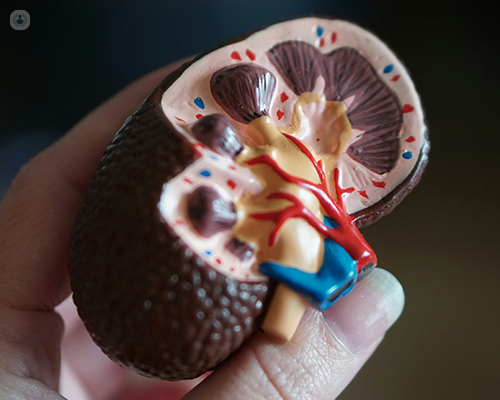Kidney-related hypertension: How your kidneys affect blood pressure
Written in association with:Hypertension, commonly known as high blood pressure, is a prevalent condition that can lead to severe health problems if left untreated. One of the critical areas in understanding hypertension is its relationship with kidney health.
Dr Rhys Evans, renowned associate professor of renal medicine and consultant nephrologist, offers an expert insight into how the kidneys affect blood pressure, the common kidney-related causes of hypertension, and the long-term outlook for patients.

How do the kidneys affect blood pressure?
The kidneys are essential for maintaining and regulating blood pressure. They maintain fluid balance, filter waste products from the blood, and manage the body's salt and water levels. Here is how the process works:
- The kidneys control the volume of fluid in the body. When there is excess fluid, it increases blood volume, leading to higher blood pressure. Conversely, when fluid levels are low, blood pressure decreases.
- The kidneys produce hormones such as renin, which regulates blood pressure. Renin activates a series of reactions that help control blood vessel constriction and blood pressure.
- The kidneys manage the levels of electrolytes, specifically sodium, which is important for maintaining blood pressure. Too much sodium, however, either through excess intake from eating too much salt or due to reduced excretion due to impaired kidney function, leads to high blood pressure.
What are the most common kidney-related causes of hypertension?
Several kidney conditions can lead to hypertension. The most common include:
- Chronic kidney disease (CKD): CKD is a long-term condition where the kidneys lose their filtering ability. This leads to a build-up of waste, sodium, and fluid in the body, raising blood pressure.
- Renal artery stenosis: Renal artery stenosis involves the narrowing of the arteries that supply blood to the kidneys. Reduced blood flow to the kidneys triggers the release of hormones that increase blood pressure.
- Glomerulonephritis: Glomerulonephritis is an inflammation of the kidney's filtering units (glomeruli). It can reduce the kidneys' ability to remove waste and excess fluids, leading to high blood pressure.
- Polycystic kidney disease (PKD): PKD is a genetic disorder where clusters of cysts develop in the kidneys. These cysts can enlarge the kidneys and impair their function, leading to hypertension.
High blood pressure can also be due to rare inherited conditions that affect how the kidney reabsorbs sodium.
What symptoms indicate kidney-related causes of hypertension?
Kidney-related hypertension often has no specific symptoms. However, certain signs may indicate underlying kidney issues, including:
- oedema (swelling) in the legs, ankles, or feet
- fatigue or feeling unusually tired
- shortness of breath
- nausea and vomiting
- frequent urination, especially at night
Inherited causes of high blood pressure may be associated with the development of high blood pressure at a young age (<40 years old), a family history of high blood pressure, or high blood pressure with abnormalities in blood electrolytes such as potassium.
How is kidney-related hypertension diagnosed?
Kidney-related hypertension is usually discovered during routine check-ups. Diagnosis involves a combination of medical history, physical examination, and specific tests. The common procedures include:
- Blood tests: Blood tests are carried out to check levels of waste products like creatinine and urea, which indicate kidney function.
- Urine tests: Urine tests are carried out to detect abnormalities such as protein or blood in the urine.
- Ultrasound: Ultrasound is performed to visualise the kidneys and detect structural abnormalities.
- CT scan or MRI: CT scans or MRIs are carried out to provide detailed images of the kidneys and surrounding blood vessels.
- Renal angiography: Renal angiography is an imaging test to look at the blood vessels in the kidneys.
If an inherited form of high blood pressure is suspected, then this can be diagnosed with a blood test, testing for genetic abnormalities.
What treatment options are available for kidney-related hypertension?
Treatment for kidney-related hypertension focuses on managing blood pressure and addressing the underlying kidney condition.
Medications
- ACE inhibitors and ARBs: These medications help relax blood vessels and reduce blood pressure. They also protect kidney function.
- Diuretics: These help the kidneys remove excess sodium and fluid, reducing blood pressure.
- Beta blockers and calcium channel blockers: These medications help lower blood pressure by different mechanisms.
Specific treatments to address underlying conditions
- Procedures: For conditions like renal artery stenosis, procedures like angioplasty may be necessary.
- Dialysis: For advanced CKD, dialysis may be required to perform the kidneys' filtering functions.
What is the long-term outlook for patients with kidney-related hypertension?
The long-term outlook varies depending on the underlying cause and the effectiveness of the treatment regimen.
Chronic conditions like CKD require ongoing monitoring and treatment to manage blood pressure and kidney function. Without proper management, kidney disease can progress, leading to more severe health issues such as end-stage renal disease (ESRD), requiring dialysis or transplantation.
With appropriate medical management and lifestyle changes, many patients can lead active, fulfilling lives. Early diagnosis and effective management of kidney-related hypertension can prevent severe complications and improve quality of life.
If you would like to schedule an appointment with Dr Rhys Evans, head on over to his Top Doctors profile today.


